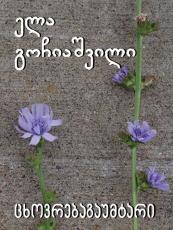Ela Gochiashvili is an utterly unique phenomenon in contemporary Georgian poetry. Her uniqueness is in both form and content, for in her case form and content overlap, and work towards producing a precise, modern tone. Nuance is the main feature of her poetry, which requires an acute poetic ear to appreciate, as well as a great variety of intonation and a polyphonic quality. This is all furthered by an extraordinarily rich vocabulary which is typical for poets who subsist on a Kartli and Kakhetian way of speaking. The variety of intonation is most obvious in her examples of ‘narrative poetry’, because the form and content of these poems naturally encompass a wide scale, which is mastered and used with great skill. In some poems free (vers libres and blank verse) and conventional poetry alternate in a way that leaves an impression of wholeness. In this collection Ela Gochiashvili has clearly expanded the boundaries and resources of the modern Georgian lyrical genre: she has offered us poetic stories that lie on the boundary of the lyrical and the epic. Among these are the cycle ‘For me and for my Two Sisters’, which is interesting in form and volume and should probably be considered as a narrative poem, and a great elegy for a mother, or hymns on motherhood. In general, many of her poems repeat the image of mother and grandmother as one and the same poetic paradigm, where one or the other, or both can be considered as the author of the poems. This is a triple possibility for womanhood, which can be realised in a variety of forms (as grandmother, as mother and as the poem’s author). Ela Gochiashvili’s poetic pathos is imbued with a sympathy for invisible, at first sight, simple human beings, objects or events, which are singled out in their everyday, mundane brilliant light, but which prefer silence and isolation. The collection also contains poems with a tense social intonation.
‘Ela Gochiashvili’s poetry seems to me as a miraculous revelation of spirituality. I don’t know of any other poet in Georgian whose poems have such expressively powerful pain. After taking in Ela Gochiashvili’s every phrase, every poetic image, it is no longer possible to live as one has hitherto in our sinful world.’
Vakhushti Kotetishvili, poet, translator
‘This voice, which seems to be the voice of a feeble, despairing person, has struck me with its amazing energy and has in various ways changed the way I see things and think about things. On first reading the poem ‘Blue Vitriol’ (actually it was the second time), too) the impression was one of astonishment as well as joy. The astonishment came because it was unexpected, and the joy because poetry had recalled something (and someone. I think that Ela Gochiashvili has written her remarkable poems in the present about her own past, and has thus created her future, which time will be unable to diminish.’
Temur Chkhetiani, poet
‘Ela Gochoashvili is the grande dame of Georgian poetry.’
Norbert Hummelt, poet, translator
Extract will be available soon
In case of using the information, please, indicate the source.
